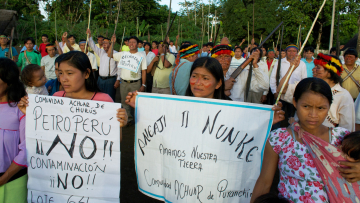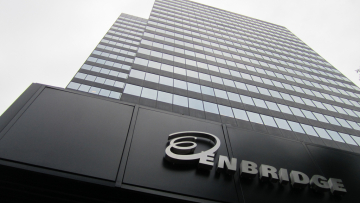Investor nuns reject Citi Indigenous report as 'wholly unresponsive' in SEC filing

Investor nuns from New Jersey are warning Citi shareholders in a filing to the Securities and Exchange Commission that a new report by the bank on Indigenous issues does not meet the demands of their resolution which is due to go before shareholders in a vote.
Citi refused to agree to the nuns’ demands for a disclosure on the effectiveness of its Indigenous rights policies in relation to its funding of projects and companies. Instead the bank published a report, without consulting Indigenous communities, that is “wholly unresponsive” and reveals that “Citi continues to finance clients and projects with track records of egregious violations of Indigenous rights and expose the company to significant risk”, the nuns’ exempt solicitation to the SEC states.
The public row between the global bank and the Sisters of St. Joseph of Peace is a warning to other US banks, JP Morgan Chase, Wells Fargo and Goldman Sachs, which also face Indigenous rights and environmental justice resolutions at this year’s annual shareholders meetings. In contrast, Indigenous investors at Royal Bank of Canada withdrew a resolution at the bank following an agreement on progress.
Three years on, Citi is scrambling to blunt investor support for the nuns’ resolution which in 2022 and 2023 attracted over 30% of shareholder vote and has become a source of embarrassment for the bank.
The Citi report on Indigenous issues admits that despite flagging 16 clients over risks to Indigenous rights, none have been refused funding or services by the bank. Out of the 37 projects which the bank identified as posing a risk to Indigenous rights, Citi refused funding for just seven.
Indigenous groups have also rejected Citi’s Indigenous report. An alliance of seven Indigenous nations from the Peruvian Amazon, impacted by oil spills and rights violations by Citi client Petroperú, have denounced Citi’s report saying they have “serious concerns” about it. Citi has refused to meet the groups when they travel from Perú to New York in two weeks.
Indigenous groups affected by Citi’s $5.8 billion funding of controversial pipeline company Enbridge are also angry at the publication of the report. This includes communities which are fighting Line 3 and Line 5 construction in Minnesota and the Rio Bravo LNG pipeline in south Texas.
The nuns’ resolution will be voted on by shareholders at the annual shareholders meeting on April 30. In contrast, Citi in recent weeks agreed with the New York City Comptroller’s demands to disclose information on ratios of energy funding and with another investor on information on its clients transition plans. Both resolutions were withdrawn.
Quotes
Sister Susan Francois of the Sisters of St. Joseph of Peace, said:
“More than 30% of shareholders supported our proposal last year and the year before, asking Citi to report concrete performance indicators on how they are respecting Indigenous People’s rights in existing and proposed general corporate and project financing. This report is very light on this critical information and does not provide shareholders with confidence that Indigenous rights are being protected. In fact, new projects are being developed now with funding from Citi that place these rights and Citi’s reputation at risk. We look forward to presenting our proposal to shareholders again and encourage Citi to respond with more robust reporting to shareholders.”
Olivia Bisa, President of the Autonomous Territorial Government of the Chapra Nation in Peru:
“Citi talks about respecting the Free, Prior and Informed Consent of Indigenous communities as set down by the UN, but it has clients like Petroperú which refuse to recognize the right to say no of seven Indigenous nations in the Peruvian Amazon. Petroperu’s disregard for Indigenous rights should mean something to the banks that lend them money; but in reality their mutual business continues. If they are serious about Indigenous rights, Citi must hold its clients accountable for ensuring that their due diligence adheres to international standards of Free, Prior and Informed Consent.”
Tara Houska (Anishinaabe), founder of Indigenous women’s and two spirit led environmental protection group, Giniw Collective, which has opposed the Enbridge pipelines in Minnesota, said:
“Clearly Citi feels the pressure of Indigenous peoples’ voices finally being heard, yet they continue to avoid truth. Free, Prior and Informed Consent of Indigenous communities does not mean consultation, it means consent. Many of Citi’s clients lack our consent, costing them billions in delays, legal fights, and reputational damage. In response to hard-won protections in project-level finance for our people and ecosystems, industry largely shifted to corporate lending to maintain the status quo. Citi’s clients are obscuring the truth from Citi, as Citi is now obscuring the truth from its shareholders: Indigenous peoples pay the direct price of violence on our communities and lands, we all pay as a species reliant on a habitable planet. We deserve better.”
Juan Mancias, Chair of the Carrizo Comecrudo Tribe of Texas, whose ancestral land will be impacted by the Rio Bravo gas pipeline which Enbridge wants to build, said:
“The title of this report is ‘Respecting the Rights of Indigenous Peoples’ but respect is a learned value, it’s not a corporate ideal. Citi can’t decide on its own who to respect because they don’t have the standards in place to do that. You can say ‘respect’ but it’s really about action. Citi’s funding of Enbridge shows it is not interested in taking the action needed to show respect.”
Gisela Hurtado, Advocacy Manager and Peruvian Attorney, Amazon Watch:
“The Indigenous Peoples of the Peruvian Amazon, represented by organizations such as FENAP, GTANW, and GTANCH, strongly condemn Citi’s recent report, ‘Respecting the Rights of Indigenous Peoples,’ for failing to adhere to international standards regarding Free, Prior, and Informed Consent (FPIC) and the right to self-determination. While the report acknowledges Citi’s commitment to Indigenous collective rights, it falls short by neglecting clear Interamerican standards on Indigenous rights and self-determination”.
Courtney Wicks Executive Director of Investor Advocates for Social Justice, which supports the Sisters of St Joseph of Peace on their shareholder filings said:
“Citi’s history of perpetuating racism and human rights violations as a result of the bank’s policies and practices has repeatedly undermined its reputation and exposed the bank to material risk. It is unclear why the company would continue to engage in such bad faith with investors and fail to consult impacted stakeholders before publishing such an egregiously inadequate report. This, coupled with the bank’s withdrawal from the Equator Principles, indicates that Citi no longer cares about its reputation or the harm its business commits against BIPOC and other marginalized peoples, or the planet itself.”
Hannah Saggau, Senior Climate Finance Campaigner, Stand.earth:
“If Citi is so eager to get investors and communities off its back then it needs to go beyond a report like this. We want to see actual policy changes where the bank agrees to end funding of egregious projects and companies which harm Indigenous communities from the Amazon rainforest to North America and places us further away from dealing with catastrophic climate chaos.”
Ryan Brightwell, campaign lead, banks and human rights at BankTrack, said:
“This flimsy paper tells us nothing about how effective Citi’s policies have been in protecting Indigenous Rights. It’s as if they haven’t understood the question. We know the bank has a track record of funding damaging extractive projects and companies, from the Cerrejon coal mine to DAPL and Line 3. But rather than dwelling on how this has been allowed to happen and what needs to improve, the bank has simply rehashed its policies and published a few numbers of transactions approved and declined.
“It’s not enough to tell shareholders there were 7 deals last year that were sufficiently outside the pale for the bank to say “no”, and this won’t reassure shareholders that the bank is managing risks effectively. Shareholders should call the bank’s bluff and insist the bank really examines its failings and improves.”
Background Info
Citi published a climate report two weeks ago which showed 71% of the oil, gas and coal companies it funds do not have sufficient climate plans to transition away from fossil fuels and address their massive emissions. Last month the bank exited the Equator Principles, which set minimum standards on risks to the environment and local communities in countries where they finance oil, gas, coal, infrastructure and mining projects. The day before its proxy book was released, Citi capitulated to New York City’s Comptroller and agreed to issue a report on the bank’s ratio of financing dirty fossil fuels vs low-carbon energy. NYC withdrew its resolution.
Citi is the second biggest funder of fossil fuels in the world, pumping in $322 billion between 2016-2022 according to the annual Banking on Climate Chaos report. Citi is one of the biggest funders of oil and gas in the Amazon and is the biggest foreign funder of fossil fuel expansion in Africa.



